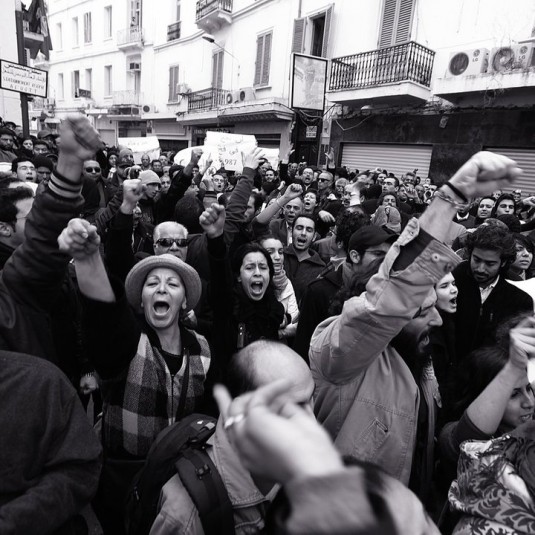Jasmine Revolution
Photo: Zied Ben Romdhane
.
With the whole world twitching, a seemingly sudden outbreak of political unrest swept across North Africa and the Middle East during the spring of 2011. The media gaze fixed upon the region, with stories of courageous civilians confronting oppressors, demanding freedom, reported around the clock. Although the ultimate outcome of these struggles remains uncertain, the stories have undoubtedly stirred the admiration and hopes of a global audience. Inspiration gave rise to a need for interpretation and explanation. It was no surprise that the main thrust of western reporting seemed to settle for a narrative which borrowed its framework and concepts from key moments of modern political history. ‘Regime change’, ‘liberty’ and ‘democratic rights’ became the catchwords associated with – what in its earliest phase was already baptized a ‘revolution’ – the ‘Jasmine revolution’.
This narrative of a flowering of revolutionary spirit reaches back to a time when sovereigns, monarchs and autocratic dictators were dethroned. The old worlds entered an era of enlightenment and liberty, embodied in the shape of parliamentary democracy and market capitalism. Official historiography was ready with the image of a tardy Arab World, slowly but finally catching up with the West – whose close relations with the ancient régime were conveniently masked under the necessities of benevolent intervention.
There is a whole other history of revolution that is exorcised by this liberal writing of official analysis. Besides events such as the Haitian, Russian, Chinese and Cuban revolutions being ignored and distorted, the bloody history of capital and the bourgeois world order and its victims is rendered irrelevant for the understanding of the struggles. Thus, very little is mentioned of striking workers, of hunger riots or of the financial crisis of 2008. These are the crucial contexts in relation to the writing of new constitutions, military ‘caretaker’ government, air strikes against formerly benevolent dictators, no-fly zones and the like. The pundits are beginning to call any connections made between Tahrir and growing civic unrest in the Euro-zone inappropriate and distasteful. Yet the squares of London, Madrid and more are also contested, however hesitantly.
We – spectators, activists and revolutionaries, would be’s and actual – are facing serious questions. What and who makes a revolution? What does it mean to be a (commenting) spectator or a ‘helping’ interventionist? What makes one revolutionary event ‘political’ and another ‘economic’? Who are made recognisable as victims, and whose existence is denied? Who (and what) is held responsible for the old order? Who is the subject that revolts – and who is the subject supposed to observe? These are questions that will hardly be answered, but at Clandestino Talks they constitute the background to the two panels and the lectures to be held during the festival and continued during the Autumn course at Clandestino Insitut.
SATURDAY 11 JUNE STORA TEATERN :: KRISTALLSALONGEN
CLANDESTINO TALKS
11.30-12.30 | JOHN HUTNYK MILITARY PROTOCOL AND CULTURAL STUDIES
13.30-15.30 | MATTIAS GARDELL,ADNANE BEN YOUSSEF, NADIA EL GOHARY
MODERATOR: EDDA MANGA
SUNDAY 12 JUNE STORA TEATERN :: KRISTALLSALONGEN
CLANDESTINO TALKS
11.30-12.30 | JEREMY GILBERT MILITARY (NEO)LIBERALISM AND THE APORIAS OF ‘LIBERAL’ DEMOCRACY
13.30-15.30 | JEREMY GILBERT, AMAZIGH KATEB, GUILIA LOLI, OTHMANE REZINE. MODERATOR: JOHN HUTNYK

